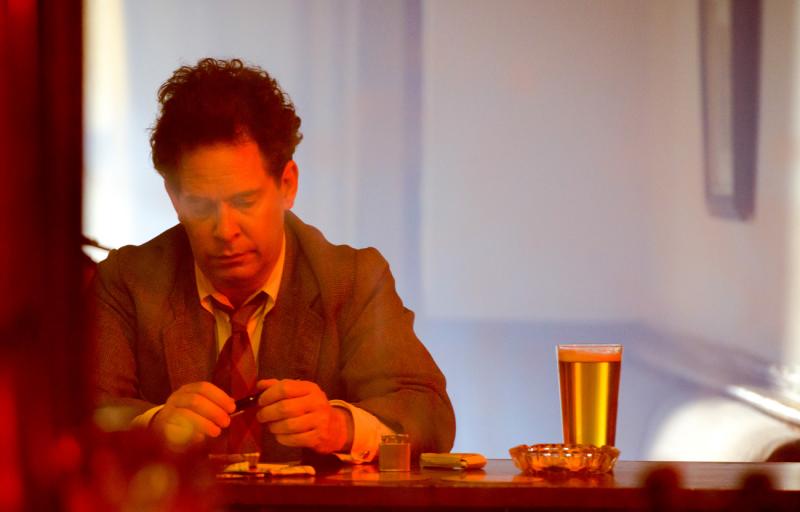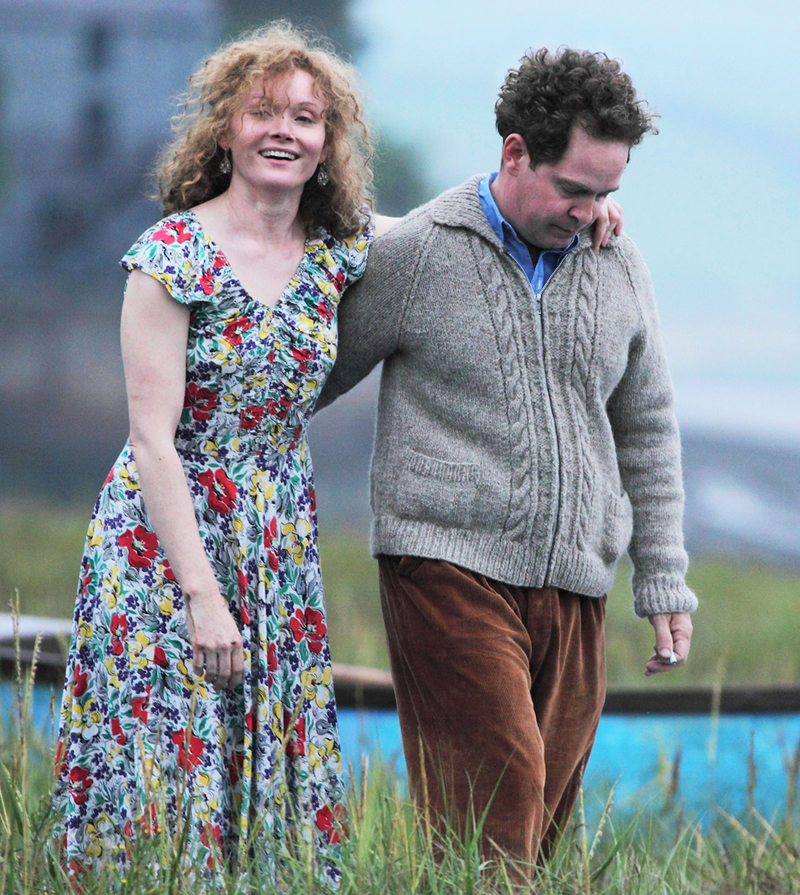Dylan Thomas: A Poet in New York, BBC Two | reviews, news & interviews
Dylan Thomas: A Poet in New York, BBC Two
Dylan Thomas: A Poet in New York, BBC Two
When the legend becomes fact, film the legend

Swansea's much-mythologised son would have been 100 in October this year, but he died in New York in 1953, from a list of medical problems exacerbated by his colossal intake of alcohol. Thomas's doomed, chaotic trajectory could almost qualify as the first rock'n'roll death, since the New York that lionised him would soon hail the Beat poets, the Folk Revival and the Bob Dylan whose adopted name and freewheelin' versifying both bore Thomas's imprint.
This film about his final days and death in New York was involving and hugely watchable, with Tom Hollander tackling the title role like a pocket-sized volcano. Having seen him so recently as the doleful and increasingly tragic cleric in Rev, if this was going to work it was vital that we were immediately confronted with an emphatically transformed Hollander. And lo, we were. Chubby, sweaty, charming, cunning, lascivious and desperate, his Dylan Thomas was infuriating but captivating, his frequently repulsive personal behaviour magicked away in the stardust of his own cascading imagery (Dylan takes a cab, below).
 He was particularly forceful in the scenes where Thomas recited his own work to spellbound audiences (his American patron John Brinnin introduced him as "perhaps the finest reader of poetry the world has ever seen," and nobody laughed). Tottering, hung over, to the lectern after throwing up in a bucket only moments before, he recited Fern Hill in a state of suspended rapture, enhanced by intercut glimpses of the idyllic childhood scenes which inspired it. Mild and wimpish-sounding in Rev, Hollander, like a thespian Clark Kent, was suddenly wielding a rolling Richard Burton-ish baritone with aplomb.
He was particularly forceful in the scenes where Thomas recited his own work to spellbound audiences (his American patron John Brinnin introduced him as "perhaps the finest reader of poetry the world has ever seen," and nobody laughed). Tottering, hung over, to the lectern after throwing up in a bucket only moments before, he recited Fern Hill in a state of suspended rapture, enhanced by intercut glimpses of the idyllic childhood scenes which inspired it. Mild and wimpish-sounding in Rev, Hollander, like a thespian Clark Kent, was suddenly wielding a rolling Richard Burton-ish baritone with aplomb.
Written by Andrew Davies and directed by Aisling Walsh, A Poet... wisely stuck to the old dictum "when the legend becomes fact, print the legend". It looked a bit like a biography, with its flashbacks to Thomas's schoolteacher-father urging him not to waste his talent and scenes of the young Dylan suffering asthmatic panic attacks after being bullied by schoolmates, but really it just lifted some of the juiciest nuggets from the Thomas mythology and gave them a loving filmic burnishing.
They'd done a fine job of recreating 1950s New York, all yellow Chevrolet taxicabs, jagged neon, weather-beaten skyscrapers and police sirens. Shots of Thomas surveying the grimy streets from a balcony on the Chelsea Hotel - how rock'n'roll is that? - were a handy metaphor for "too fast to live, too young to die", and the way every bar he went into enveloped him in a warming whisky-coloured light and raw, bluesy jazz music merely underlined it. "I have abused the temple of my body in every way known to man," he orated at one point, as though laying down a template for all self-destructive artists with a fat narcissistic streak.
 Certainly a little of his deranged behaviour must have gone a long way, even if we could have done with a few more of his obscene limericks. His approach to getting the opposite sex into the sack was more like ram-raiding than seduction ("I've fallen in love with you, we must spend the night together, I absolutely insist," was his opening remark to one female stranger), while his alcohol-fuelled relationship with wife Caitlin (Essie Davis, pictured left with Hollander) was a strip-cartoon explosion of rage, infidelity and remorse, more of an addiction than a marriage. But then, listening to choice extracts from Under Milk Wood or Do Not Go Gentle into That Good Night, you began to understand how he got away with it.
Certainly a little of his deranged behaviour must have gone a long way, even if we could have done with a few more of his obscene limericks. His approach to getting the opposite sex into the sack was more like ram-raiding than seduction ("I've fallen in love with you, we must spend the night together, I absolutely insist," was his opening remark to one female stranger), while his alcohol-fuelled relationship with wife Caitlin (Essie Davis, pictured left with Hollander) was a strip-cartoon explosion of rage, infidelity and remorse, more of an addiction than a marriage. But then, listening to choice extracts from Under Milk Wood or Do Not Go Gentle into That Good Night, you began to understand how he got away with it.
Add comment
The future of Arts Journalism
You can stop theartsdesk.com closing!
We urgently need financing to survive. Our fundraising drive has thus far raised £49,000 but we need to reach £100,000 or we will be forced to close. Please contribute here: https://gofund.me/c3f6033d
And if you can forward this information to anyone who might assist, we’d be grateful.

Subscribe to theartsdesk.com
Thank you for continuing to read our work on theartsdesk.com. For unlimited access to every article in its entirety, including our archive of more than 15,000 pieces, we're asking for £5 per month or £40 per year. We feel it's a very good deal, and hope you do too.
To take a subscription now simply click here.
And if you're looking for that extra gift for a friend or family member, why not treat them to a theartsdesk.com gift subscription?
more TV
 Murder Before Evensong, Acorn TV review - death comes to the picturesque village of Champton
The Rev Richard Coles's sleuthing cleric hits the screen
Murder Before Evensong, Acorn TV review - death comes to the picturesque village of Champton
The Rev Richard Coles's sleuthing cleric hits the screen
 Black Rabbit, Netflix review - grime and punishment in New York City
Jude Law and Jason Bateman tread the thin line between love and hate
Black Rabbit, Netflix review - grime and punishment in New York City
Jude Law and Jason Bateman tread the thin line between love and hate
 The Hack, ITV review - plodding anatomy of twin UK scandals
Jack Thorne's skill can't disguise the bagginess of his double-headed material
The Hack, ITV review - plodding anatomy of twin UK scandals
Jack Thorne's skill can't disguise the bagginess of his double-headed material
 Slow Horses, Series 5, Apple TV+ review - terror, trauma and impeccable comic timing
Jackson Lamb's band of MI5 misfits continues to fascinate and amuse
Slow Horses, Series 5, Apple TV+ review - terror, trauma and impeccable comic timing
Jackson Lamb's band of MI5 misfits continues to fascinate and amuse
 Coldwater, ITV1 review - horror and black comedy in the Highlands
Superb cast lights up David Ireland's cunning thriller
Coldwater, ITV1 review - horror and black comedy in the Highlands
Superb cast lights up David Ireland's cunning thriller
 Blu-ray: The Sweeney - Series One
Influential and entertaining 1970s police drama, handsomely restored
Blu-ray: The Sweeney - Series One
Influential and entertaining 1970s police drama, handsomely restored
 I Fought the Law, ITVX review - how an 800-year-old law was challenged and changed
Sheridan Smith's raw performance dominates ITV's new docudrama about injustice
I Fought the Law, ITVX review - how an 800-year-old law was challenged and changed
Sheridan Smith's raw performance dominates ITV's new docudrama about injustice
 The Paper, Sky Max review - a spinoff of the US Office worth waiting 20 years for
Perfectly judged recycling of the original's key elements, with a star turn at its heart
The Paper, Sky Max review - a spinoff of the US Office worth waiting 20 years for
Perfectly judged recycling of the original's key elements, with a star turn at its heart
 The Guest, BBC One review - be careful what you wish for
A terrific Eve Myles stars in addictive Welsh mystery
The Guest, BBC One review - be careful what you wish for
A terrific Eve Myles stars in addictive Welsh mystery
 theartsdesk Q&A: Suranne Jones on 'Hostage', power pants and politics
The star and producer talks about taking on the role of Prime Minister, wearing high heels and living in the public eye
theartsdesk Q&A: Suranne Jones on 'Hostage', power pants and politics
The star and producer talks about taking on the role of Prime Minister, wearing high heels and living in the public eye
 King & Conqueror, BBC One review - not many kicks in 1066
Turgid medieval drama leaves viewers in the dark
King & Conqueror, BBC One review - not many kicks in 1066
Turgid medieval drama leaves viewers in the dark
 Hostage, Netflix review - entente not-too-cordiale
Suranne Jones and Julie Delpy cross swords in confused political drama
Hostage, Netflix review - entente not-too-cordiale
Suranne Jones and Julie Delpy cross swords in confused political drama

Comments
The film was made for the
Well of course it was made
I thought the ending was